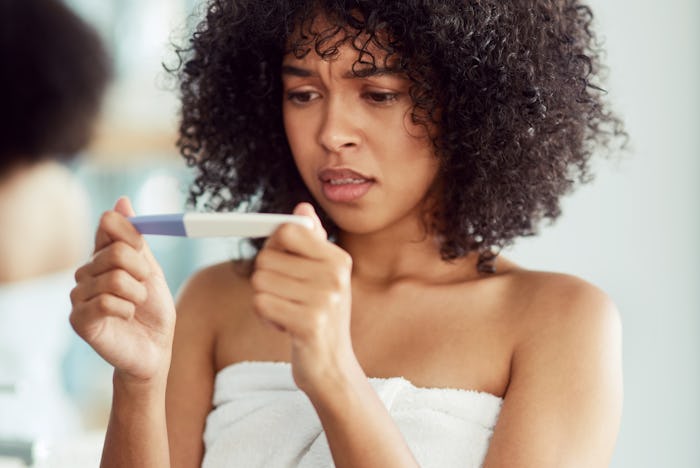TTC

Here’s How Masturbating Affects Egg Implantation, According To Experts
You: happy. Your egg: unbothered.
Masturbation has always been tied up in taboos and misinformation, especially for women. The stigma associated with it, in addition to years of silence around the subject, has led to all kinds of medical questions, like, does female masturbation affect implantation of an egg? When you’re trying to conceive, it’s easy to get mired in the details of what’s helping and hurting your chances. But OB-GYNs and fertility experts agree that a little self-loving is not going to make or break your shot at getting pregnant this month.
Effects of masturbation on implantation
Let’s set the record straight once and for all: “Women can rest assured that orgasm doesn’t negatively impact any component of fertility in regards to ovulation, fertilization, or implantation,” says Dr. Jennifer Hirshfeld-Cytron, M.D., a board-certified reproductive endocrinologist at the Fertility Centers of Illinois. “Many women share this concern with me, and I think it is important to know that if you masturbate or experience orgasm, it will not negatively impact any component of fertility treatments or trying to conceive on your own.” In short, female masturbation does not affect implantation.
“The embryo implants seven to eight days after ovulation, or two to three days after a blastocyst transfer during fertility treatment,” says Dr. Elie Hobeika, M.D., board-certified reproductive endocrinologist at the Fertility Centers of Illinois. “There are no studies that have shown that masturbation affects implantation.”
But it’s easy to see why so many might think masturbation might affect egg implantation, or even be a cause of infertility. It used to be a no-no during treatment for infertility, but that’s no longer the case. “In the context of someone completing fertility treatment, we’ve come a long way from forbidding any sexual activity leading to orgasm to promoting it to aid in conception,” says Dr. Edward Marut, M.D., board-certified OB-GYN and reproductive endocrinologist. “Neither is necessarily true.” (He, too, agrees that “female masturbation cannot disturb egg implantation.”)
Unless there is an issue with enlarged ovaries following fertility treatment (which may not be known until the first pregnancy ultrasound), abnormal bleeding, or a pregnancy of unknown location (as in, potentially ectopic), there is no reason to think that orgasm should be avoided, Marut says. This is especially true in a natural cycle where conception could occur without medical intervention — though obviously this has more to do with having sex with a partner.
When to avoid masturbation
Women undergoing fertility treatments who have an embryo transferred to the uterus are advised to take it easy that day. “But that is the only context where pelvic rest would be recommended,” says Marut. “For couples trying to conceive, pelvic rest would be at odds with how fertility can occur.” (Wink wink.) In other words, unless your doctor tells you to avoid it, masturbation and sex are rarely discouraged.
Can masturbation help fertility?
There is some evidence to suggest that “women retain more sperm if coital orgasm occurs after, rather than before male ejaculation,” according to a 1998 study published in the Archives of Sexual Behavior. In plain English, that means a P-in-V orgasm that happens after your man ejaculates is the most likely sequence of events to end in a pregnancy. So, depending on how your romp between the sheets plays out, masturbating may come in handy to achieve this order of events. (And if not for the end result of pregnancy, then for the possibility of pleasure alone.)
If you’re undergoing fertility treatment, you may still feel like masturbating is just not worth any potential risk of disturbing your egg’s implantation. But these experts feel very confident that you don’t need to worry about it. “Women who conceive naturally have intercourse concurrent to implantation and the embryo is still able to implant,” says Hobeika. So, it should work the same way for women undergoing fertility treatment.
Study referenced:
Singh, Meyer, Zambarano, & Farley Hurlbert. (1998, February). Frequency and Timing of Coital Orgasm in Women Desirous of Becoming Pregnant. Archives of Sexual Behavior, 27, 15–29. https://doi.org/10.1023/a:1018653724159
Experts:
Dr. Jennifer Hirshfeld-Cytron, M.D., board-certified reproductive endocrinologist at the Fertility Centers of Illinois
Dr. Edward Marut, M.D., board-certified OB-GYN and reproductive endocrinologist
Dr. Elie Hobeika, M.D., board-certified reproductive endocrinologist at the Fertility Centers of Illinois
This article was originally published on